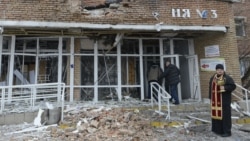Incoming OSCE Chair Serbia Treads Carefully On Ukraine
By Albert Otti
Basel, Switzerland (dpa) -- Serbian Foreign Minister Ivica Dacic made clear on Friday that the Ukraine crisis was not simply Russia's fault, setting the tone for his upcoming chairmanship of the Organization for Security and Co-operation (OSCE).
At the turn of the year, Switzerland will pass on the chairmanship
and the task of dealing with Ukraine to Serbia, which has close ties with Moscow, but is at the same time aiming to join the European Union.
Dacic's statement at the annual OSCE foreign ministers conference in Basel stood in contrast to many of his counterparts at the meeting, who clearly pointed to Russia as the main culprit in the conflict.
"Different perceptions of the root causes and erosion of trust and
confidence led to the escalation of the crisis, and these issues need to be adressed urgently," Dacic said at the end of the conference.
Russian Foreign Minister Sergei Lavrov said in Basel on Thursday that the eastward expansion of NATO and the EU had not taken into account Russian interests, and warned against a Western monopoly on security in the region.
The crisis in Ukraine was set in motion when the government of
Russian-backed President Viktor Yanukovych suspended a planned association agreement with the EU late least year, a decision that led to his removal from office.
Germany will chair the pro-democracy and security organization in 2016, and Austria will follow in 2017, the group's 57 countries
agreed Friday.
The OSCE has taken on various tasks including environmental and gender issues in past years, but German Foreign Minister Frank-Walter Steinmeier said Thursday that the group should reconnect to its core task of building security through dialogue and confidence-building measures.
Germany calls Putin's Crimea claim "religious magnification":
Berlin (dpa) - A claim by Russian President Vladimir Putin that Crimea is like the Temple Mount to Russians was rejected as a "religious magnification" Friday by a spokesman for German Chancellor Angela Merkel.
"That in no way justifies the breach of international law that Russia committed by the annexation of Crimea," Steffen Seibert said, adding that the peninsula had been the home of various ethnic groups of varying religions for centuries.
He insisted that German policies on the Ukraine conflict are not anti-Russian but are designed to call a breach of international law what it is and create incentives for a diplomatic solution.
Putin‘s remarks Thursday had "an obviously domestic motivation," Siebert said.
Putin had said in a Moscow speech that the Crimea is as sacred to Russia as Jerusalem‘s Temple Mount is to Jewish people.
"It was here that the spiritual source of the long-standing monolith of the Russian nation and the Russian central state were formed," Putin said.





